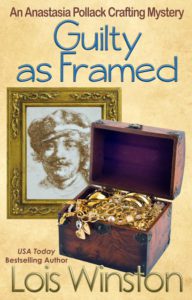 By Lois Winston
By Lois Winston
Do you have a grammar pet peeve? I do, thanks to Peggy Riley Hughes, my seventh and eighth-grade English teacher. Because of Mrs. Hughes, I cringe whenever I hear or read poor grammar. If the world had more Peggys, I’d cringe a lot less.
To boldly go where no man has gone before. Remember that opening from Star Trek? Cringe-worthy! Gene Rodenberry obviously didn’t have Peggy Riley Hughes as an English teacher. If he had, he never would have split his infinitive.
Sadly, because there are so few English teachers like Peggy Riley Hughes, the Oxford English Dictionary did the unthinkable years ago—they declared it okay to split infinitives. Horrors! What would Peggy say?
Writers have license to take liberties with their writing. When I write dialogue, I don’t necessarily write in perfectly formed sentences because people don’t always speak in perfectly formed sentences. We often use sentence fragments. Our characters rarely speak using perfect grammar. That’s okay. We want them to sound realistic, not stilted. Style will also often dictate that sentence fragments be used in narrative.
There are, however, grammar rules that should never be broken.
Anyone who wants to be a writer, needs a firm grasp of the English language. Why is this important? Won’t the editor correct whatever needs correcting? Once upon a time that may have been true. However, these days editors don’t have the luxury of time to mollycoddle an author with a great story idea but a poor command of the English language. There are plenty of other well-written manuscripts at the editor’s fingertips.
The grammar error that makes me cringe the most, is the misuse of pronouns. For some reason, many people think substituting the nominative for the objective sounds more intelligent, no matter that it’s wrong. I see very well-educated people making this mistake all the time in their speaking and their writing. It makes me wonder if grammar is even being taught in schools these days.
If English class is a distant memory, here’s a nominative/objective refresher:
Nominative Pronouns: I, you, he, she, it, we, they, and who.
Objective Pronouns: me, you, him, her, it, us, them, and whom.
The nominative is always used as the subject of the sentence. The objective is always used in the predicate of a sentence and pairing with a direct object.
Think about it: You wouldn’t say, “John helped I” or “She gave the papers to I,” so why would you say, “John helped Suzie and I” or “She gave the papers to John and I”? It makes no sense, right?
Please consider your pronouns in your speaking and writing. I fear that whenever someone misuses them, Peggy Riley Hughes turns over in her grave. Help give the poor woman a much-deserved rest!
 Guilty as Framed
Guilty as Framed
An Anastasia Pollack Crafting Mystery, Book 11
When an elderly man shows up at the home of reluctant amateur sleuth Anastasia Pollack, she’s drawn into the unsolved mystery of the greatest art heist in history.
Boston mob boss Cormac Murphy has recently been released from prison. He doesn’t believe Anastasia’s assertion that the man he’s looking for doesn’t live at her address and attempts to muscle his way into her home. His efforts are thwarted by Anastasia’s fiancé Zack Barnes.
A week later, a stolen SUV containing a dead body appears in Anastasia’s driveway. Anastasia believes Murphy is sending her a message. It’s only the first in a series of alarming incidents, including a mugging, a break-in, another murder, and the discovery of a cache of jewelry and an etching from the largest museum burglary in history.
But will Anastasia solve the mystery behind these shocking events before she falls victim to a couple of desperate thugs who will stop at nothing to get what they want?
Buy Links for paperback, hardcover, and various e-tailers can be found here.
Bio: USA Today and Amazon bestselling and award-winning author Lois Winston writes mystery, romance, romantic suspense, chick lit, women’s fiction, children’s chapter books, and nonfiction under her own name and her Emma Carlyle pen name. Kirkus Reviews dubbed her critically acclaimed Anastasia Pollack Crafting Mystery series, “North Jersey’s more mature answer to Stephanie Plum.” In addition, Lois is a former literary agent and an award-winning craft and needlework designer who often draws much of her source material for both her characters and plots from her experiences in the crafts industry. Learn more about Lois and her books at her website www.loiswinston.com where you can also sign up for her newsletter and follow her on various social media sites.

I agree with you about the pronoun problem. I think it stems from asking questions as a child, “Can me and Johnny go to the store?” and being corrected to, “Johnny and I.” The lesson learned is that “I” is always correct (and more formal) regardless of case. They don’t seem to teach “parts of speech” in school anymore so few people know the difference between a subject and an object. And when they really want to be formal, they’ll use “myself.”
Interesting thoughts. In reading Lois’ post, which I thought was excellent – as is the new book – I hadn’t thought about what I was taught as a child and what isn’t being taught in the same way now. Thanks for stopping by.
Sharon, I fear you’re right about parts of speech no longer being taught in schools. As for “myself,” that’s another grammar pet peeve that may someday show up in a blog post!
Lois,
Thanks for the insightful and thoughtful grammar lesson today.
You’re welcome, Debra! And thanks for inviting me to visit your blog today.
I realize I’m beginning to be a language curmudgeon. Yes, pronoun use makes my crazy, as does using “That” for “who”. And nouns that get verbalized, e.g. “exit” for “left” the room.
Thanks for the reminder!
Thanks for stopping by and commenting, Michele.
Isn’t it amazing what drives us crazy – it reflects what we were taught in school. Appreciate you leaving a comment today.
The pronouns bother me too, and I agree some people think it’s sophisticated to use the nominative in place of the objective. The error though that I crusade about all the time is the confusion between lie and lay. You do not lay out on the beach–you lie on the beach. When I was a kid my next-door neighbor warned us, “Hens lay, people lie.”
Another good one, Judy!
Great example. Thanks for stopping by today.
Dangling modifiers drive me insane. I.e. “At fifty-seven, his hair was sprinkled with gray.” His hair was fifty-seven, of course, but I think she was referring to the man. ( Nancy Taylor Rosenberg) Did someone make these okay? Because they’re not okay with me.
:). Sometimes, I think I take dangling modifiers for granted because I’ve read so many of them. Appreciate you leaving a comment today.
Not okay with me, either, Candace. I have to say, though, I’ve seen far worse misplaced and dangling modifiers. I once read a book where the character “grabbed a towel, stepped out of the shower, and wrapped it around his waist.”
love this example!
I am not a writer. I am how ever an avid reader and I constantly cringe with how grammer is so pore with the best of some of the authors I read. I wonder if part of the problem is where the person is from if english is perhaps their second language. One of my own pet peeves the use of the words can I instead of may I .I remember my granny constantly saying to me ” I don’t know if you can but you may if you want to ” .I discovered recently that grammer isn’t taught in lower level education anymore. GASP.😲Kat
Sadly, it appears that teaching grammar in schools has gone the way of the dodo bird, Kat.
As has the teaching of cursive writing and reading a clock that isn’t digital or attached to a phone.
I agree with you on grammar boobs and it seems increasingly normal to get past tenses wrong. However, I can’t help but notice that in two places you have a comma separating your noun phrase from your verb. Not technically grammar, I know, but punctuation…
Hmm…I went back and looked at the post, Susan. Commas are routinely used to set off subordinate (also known as dependent) clauses, interjections, lists, and two independent clauses joined by conjunctions. I don’t see any place where I’ve misused a comma. Peggy was also a stickler for correct punctuation. I will say, though, that I’ve learned that punctuation rules differ between British English and American English. They often do the opposite of what we do, especially when it comes to clauses. If you’re more attuned to reading British authors, I can see why you’d think my commas setting off dependent clauses at the beginning of a sentence would be wrong.